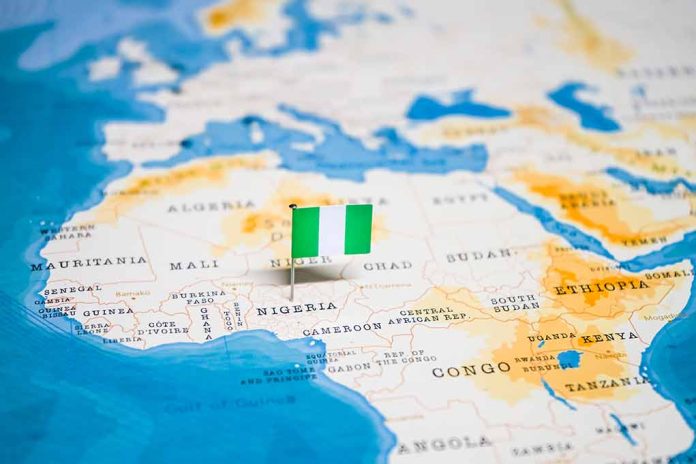
At least 40 Christians were massacred in north-central Nigeria by Muslim gunmen, highlighting an escalating conflict over land resources that continues to devastate local communities despite government security measures.
Key Takeaways
- Muslim Fulani herders killed at least 40 people (with some reports citing 54 deaths) in a Christian farming community in Plateau state’s Zike village, continuing a pattern of religious and resource-based violence.
- President Bola Tinubu has ordered an investigation into the attack, while Amnesty International condemned security lapses that allowed the high death toll.
- The violence represents an ongoing conflict between Muslim herders and Christian farmers over increasingly scarce land resources, exacerbated by climate change and economic pressures.
- More than 1,336 people were killed in Plateau state between December 2023 and February 2024, indicating the government’s failure to protect vulnerable communities.
- Homes were destroyed and looted during the midnight attack, adding to the humanitarian crisis in the region.
Deadly Midnight Raid Leaves Dozens Dead
A brutal attack by armed Muslim Fulani gunmen on a Christian farming community in north-central Nigeria has left at least 40 people dead, according to officials. The massacre occurred in the Zike community located in the Bassa area of Plateau state, when assailants launched their assault between midnight and 1:00 a.m., catching victims completely unprepared. Amnesty International reported that the victims, including children and elderly residents, were taken by surprise and unable to flee the violence. The Red Cross counted 52 deaths, while Amnesty International documented 54 fatalities in what appears to be part of an escalating pattern of religiously and resource-motivated violence in the region.
Local resident Andy Yakubu reported that in addition to the killings, numerous homes were destroyed and looted during the attack. He warned that the death toll could ultimately exceed 50 as recovery efforts continue. This massacre follows months of similar violence, with Samuel Jugo, spokesperson for the Irigwe Development Association, stating that at least 75 Irigwe people have been killed since December 2024 despite increased security deployments in the area. The persistent attacks demonstrate significant security failures and have prompted outrage from residents and humanitarian organizations alike.
Amnesty International condemns the massacre of at least 51 people in Zikke village, Plateau State, Nigeria
Gunmen razed homes, looted villages, and left a trail of devastation
‘Everything was destroyed in their path’ pic.twitter.com/RX5acieBBV
— RT (@RT_com) April 14, 2025
Government Response and Security Failures
President Bola Tinubu has ordered a thorough investigation into the attack and extended condolences to the victims and their families. Despite these gestures, questions about the government’s ability to protect vulnerable communities remain widespread. Security forces, deployed to the region after previous incidents, failed to prevent or intervene in the latest attack, raising serious concerns about intelligence gathering and rapid response capabilities. The ongoing violence, despite increased security presence, suggests fundamental problems with Nigeria’s approach to rural security and conflict resolution.
Amnesty International has been particularly critical of the Nigerian government’s handling of the crisis. The human rights organization noted that 1,336 people were killed in Plateau state between December 2023 and February 2024 alone, indicating that current measures to curb violence are woefully inadequate. Their statement directly questioned the effectiveness of government security actions and called for greater accountability for those responsible for orchestrating and carrying out these attacks. The organization’s data reveals a deeply troubling pattern of violence that shows no signs of abating.
Land Resource Conflict and Religious Tensions
The violence in Plateau state represents a complex intersection of resource competition, religious divisions, and ethnic tensions. The attackers are typically herders from the Muslim Fulani tribe, while victims are predominantly Christian farmers. This conflict over increasingly scarce land resources has been exacerbated by climate change, which has pushed traditionally nomadic herders farther south in search of grazing land. As Nigeria’s population grows and agricultural land becomes more valuable, competition for these resources has intensified, often aligning with pre-existing religious and ethnic divisions.
The Fulani have been accused of mass killings in the northwest and central regions of Nigeria, which has deepened divisions between farmers and herders, Christians and Muslims. This particular conflict is separate from the Boko Haram insurgency that began in 2009, representing a different but equally destructive threat to Nigeria’s stability and security. Samuel Jugo described the latest attack as “very provocative, vexing and undeserving,” expressing the frustration of communities that feel abandoned by government security forces during their time of greatest need.
Humanitarian Impact and Regional Stability
The humanitarian impact of these attacks extends far beyond the immediate death toll. Survivors face displacement, property destruction, and severe trauma. Agricultural production, vital to both local food security and the regional economy, has been significantly disrupted as farmers fear returning to their fields. Villages that once thrived now stand abandoned or in ruins, with community structures built over generations destroyed in hours of violence. These attacks threaten not only individual lives but the very fabric of rural society across north-central Nigeria.
President Tinubu has emphasized the need for peace between communities, stating, “The ongoing violence between communities in Plateau State, rooted in misunderstandings between different ethnic and religious groups, must cease.” However, many residents view such statements as insufficient without concrete protection and justice. While government officials continue to pledge investigations and accountability, affected communities remain skeptical, pointing to years of similar promises that have failed to prevent subsequent attacks or bring perpetrators to justice.
Sources:
Attack leaves at least 40 people dead in Nigeria, the country’s president says
Nigeria: Amnesty condemns government after deadly attack







